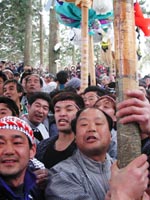| Japan Links and Information | |
|
Links.net Coverage of Japan:
 Roppongi: GasPanic
|
From the Web at Large: Monday, 15 April From Stephen Church of Analytica Japan, 1500 word glossary of Japanese terms. It's an unusual mix of culture, business and politics, written out in plain English and romanji for the general reader.This is a man who once told me that I had to understand the Weimar republic in Germany before I could understand the banking problems today in Japan. Accordingly, his list of terms for Japan is sprinkled with things like: Bismarck - Prince Otto von Bismarck 1815 - 1898 Chancellor author of late 19th cent Prussian socio-politics but there's a lot of great little phrases explained throughout: satori - enlightenment, Nirvana, Buddhahood as satori ga osoi to be slow on the uptake (ironical) Especially for someone hoping to understand business in Japan, this should be an invaluable list. In addition, it would probably be an entertaining quantum leap for many beginning Japanese students to sprinkle their conversation with any of these phrases.
Thursday, 14 February It was observed to me recently that Japan and the other Asian economies took off in the world market as soon as they boosted their savings rate. This at the FCCJ from Eamonn Fingleton, a writer from Ireland based in Japan, who will have a piece in the March issue of the Atlantic Monthly about America's unsustainable trade deficit. If I understood him correctly, America is no longer producing much while consuming rapidly. American assets; companies, real estate, are being sold off to finance that consumption.

Take this recent bit of horrific soothsaying:
The Panic Spreads You can no longer safely shrug off Japan's economic crisis. It just might drag the world into a depression. The world--and even the previously sanguine Japanese--is now catching on to the fact that Japan's 12-year slump has deteriorated into a full-blown crisis, threatening a wild global ride. Falloffs in various indicators in the world's second-largest economy resemble the plunge of countries like the U.S. into the Great Depression of the 1930s. What about the theory that Japan is so rich a nation that it can buy its way out of a financial collapse? After all, it is said, the huge debt overhang from the country's rotten banking system and the actuarial deceit of its postal- and insurer-based retirement systems is just Japan owing itself. This is not Russia or Argentina or Thailand. No, it's not Russia or Argentina. It is potentially something far worse. "Japan is 42 times bigger than Thailand," says Kenneth Courtis, vice chairman for Goldman Sachs (nyse: GS - news - people) in Asia, referring to the country dubbed the epicenter of the 1997 Asian crisis. That bout cut world output by $300 billion in a year. Japan represents the "largest economic crisis since the 1930s," says Courtis. "The world is heading for a once-in-a-century economic crisis," agrees Ryoji Musha, strategist for Deutsche Bank The rest can be read here. I used to read these sorts of articles with interest and some safe fear, that somehow I was watching a massive unraveling, and in fact I was participating in something momentous and exciting - Japan's steep and painful decline. Of course there would be pain; that's my job to chronicle - the ordinary people shut out from prosperity from a corrupt system. But as the tone of these doomsayers has grown both shrill and repetitive, I find myself increasingly disinterested. Now Japan is no longer simply facing a banking crisis, but Japan in on the verge of plunging towards Bangladeshian poverty levels, dragging the rest of the world into instability and World War III.
Of course if it happens that will be something remarkable. In the meantime there's a million proposed solutions*, and Eamonn Fingleton pointed out that still the Japanese are driving new cars, eating marvellous food
Of course if there were another cult terrorist attack, or maybe the rise of some fascist leader, then there would be other news to report about Japan. But until then, Japan continues to stagger about in large fonts. Meanwhile, I think the winter festivals of Akita are quite newsworthy. Yuzawa's snowy dog houses was last week, Yokote's famed Kamakura festival is this week. I've decided to boost my savings rate to personally emulate the Asian economies during their growth years. Current targeted savings rate: 10%. Current rate of interest on >$6000 credit card debt: 21.9%. * - one of the proposed solutions for the hobbled, hamstrung Japanese economy is to correct the steady decline in the prices of commercial real estate in Japan. This according to Akiyoshi Inoue, and I should know because Wayne at the club asked me to write the blurb for his upcoming dinner lecture. "But I know nothing of commercial real estate appraisal!" It was my chance to learn. (Friday: The Economist's new cover story is Japan in Decline)
11 February Japanese Red ArmyDid you know that Japan has an anti-government, anti-monarchy terrorist group that bombed the Tel Aviv airport in 1972 and attempted to bomb the New Jersey Turnpike? The Japanese Red Army is lead by a woman, Fusako Shigenobu, who was said to be based somewhere in a mountain valley in Lebanon, until her arrest in Osaka in 2000. They even tried to take credit for September 11. There's "Unofficial Site" with some English language communiques, and someone on a "anti-patriarchy" mailing list calling for a protest against Shigenobu's arrest, with some news about her in that post. Finally, a web site in favor of the Tamil Tigers has pictures of the JRA with some reprinted articles.
12 January In the video store, I picked up a horror movie. Ayako asked if wanted to see the biggest deal horror movie recently in Japan? So we rented Ringu. I've never watched a horror film without being able to understand the language. I didn't watch close but I was still scared. A girl with long black hair in a white dress terrorizes the world around her as her fragile mental state seems to be controlled by some outside force eating her from within. This girl h soasme kind of psychic power, seeing ghosts or the future, fucks shit up all around her, the result of an experiment gone wrong, all investigated by a reporter. Carrie stars in the Sixth Sense as seen through Scream. With striking visuals.
10 January Country-Pumpin' GangstaGiant banks in Japan loaned scads of money to Yakuza at the height of the Japanese economic bubble. The Yakuza used that money to invest themselves in nearly every industry in Japan: "...they found yakuza active in literally every sector of the Japanese economy; not only in areas such as construction, entertainment and trucking that have long been suspected of heavy yakuza involvement, but in everything from chemicals to hospitals. From The Far Eastern Economic Review: The Yakuza Recession
31 December Gauging New Year's in JapaneseYou can see what kind of a big deal New Year's is in Japan by the amount of language they have to describe the holiday.
27 December Navigating Tokyo's 'electrographic architecture'
"If you're printing a flier in Tokyo, you put a little map in one corner showing, not street names or monuments recognisable citywide, but the nearest subway exit and then the positions, relative to your club, of local branches of conbini chains like AM/PM, or landmarks like McDonalds and Starbucks. This is because most built structures in Tokyo are impermanent, unremarkable, boxlike and forgettable. What marks one from another is its 'electrographic architecture' -- the neon and LED displays mounted on facades, the graphic design of familiar logos draped, often several stories deep, across their blank faces." Scottish musician Momus continues to provoke, inspire and muse on his personal web site. His time in Tokyo has figured prominently in his writings ever since. Visit his essays.
25 December Mad in JapanThis article upset many folks when it was first published in September; I was recently turned on to it at the FCCJ by Henry Scott-Stokes who described it as "a ceaseless flow of offensive remarks; a fierce denunciation." AA Gill: Mad In Japan (originally printed in the Sunday Times of London, 9 September) It is blistering, and at points hilarious. The pace is wearing though; by the end he's managed to overextend his hatred. I didn't think people wrote and publishing things this biased anymore. Looming China Mr. Scott-Stokes also pointed out this piece from the Financial Times, 22 December: Early tremor in developing fault line between rivals. from the article: "China, strengthened by 21 years of free market reform and hundreds of billions of US dollars in foreign investment, is doing to Japan what Japanese manufacturers did to their competitors in the West in the l960s and l970s." Regardless of the quality of the piece, HSS observes: "The bigger fact is that China's hour has struck. The giant has awoken. The huge gong is being struck." Of course this is a great story for the idle western journalist - one Asian power tearing down another. Still I can't help but share Henry's feeling that there is a lot of heat in this part of the world and it is largely eminating from China today. With news of nothing but the failing economy and unraveling social structure, Japan stands by watching as its place as the head of Asia is steadily wavering, leaving them these days serving perhaps as the hat of Asia.
5 December By the Power of Rikai, I have the Power.Probably the most amazing, and useful web application for bilinguality I've yet seen is Todd Rudick's Rikai. Visit that URL, give it another web address, and then you can float your pointer over bits of Japanese and you'll see popup windows with bits of translation. Mind-bogglingly cool, and utterly handy in a pinch. Kanji Flasher Those looking to harness the power of technology for ways to LEARN KANJI FAST FROM HOME should enjoy the Java Kanji Flashcards. (That last link courtesy of Jim Breen, who runs an excellent page listing online Japanese language resources). 17 October Artful Financing?
From the Mainichi Daily News:
16 October www dot WaiWaiFrom Campbell at Mainichi Daily News, a pointer to their WaiWai section, listing funny, usually strange and sexual news translated from Japanese tabloids.
14 October Starbucks and SmokingThere's plenty of smoking in Japan, but not at Starbucks. Starbucks, which is threatening to become nearly as popular as 7-11 here in Japan, bans smoking in its cafes. Between the sweet taste, and the smoke-free environment, Starbucks seems to be appealing to some polite young folks. At least if you take this Japan Times VoxPop seriously. På Svenska! This turns out to be a two week period when Japan and Sweden are exploring each other here in Tokyo. Here's the Swedish Style in Tokyo linup and some links and writing from Asienguiden: Japan.
11 October let's tokyo future fashion shopping!From Jonathan Hurwitz, a link to SuperFuture.com a sort of annotated map for hip stuff in Tokyo. Here's what he says:
This site also has NYC and Sydney, but their Tokyo info is great, 5 of my friends used it it Tokyo for shopping. Make sure to go to BATHING APE while you are in Tokyo, its a total cult. Supreme is also worth checking out.I'll see yous there!
10 October Japan Adult Video NewsTo get a sense of the international sex media trade, you can search Adult Video News for Japan. Unfortunately, all the news falls off after mid-year this year. Maybe they need some more writers? Interesting things to note - Japan didn't get the pill until 1999, Japan has tried to export porn to the United States with varying degrees of success and permission, asian/white porn is not considered interracial in the US.
9 October Compai Times
A recent piece in the New York Times featuring tastes from Tokyo:
29 September How Japan Can RecoverWayne sends a link to The Fear Economy, by Paul Krugman. It's a reasoned study from a wise mind on the post-terrist state of the American economy. Japan figures large, as their perpetual decade of recession might loom large here. This was fun to read:
"...the rise and fall of Japan's financial bubble sounds all too recognizable to post-millennial Americans. An already advanced nation pulls ahead of its first-world peers, taking the lead in all the hot new technologies. Stock prices soar to levels that look insane using conventional criteria, but everyone agrees that in such a dynamic economy old rules no longer apply. And then the bubble bursts, leaving behind a mountain of bad debts and an economic engine that refuses to turn over. Name two countries whose experiences in the last 20 years fit that description."How Japan can recover by Lars E.O. Svensson forms the underpinning for some of Krugman's arguments. Hanami Cherry blossoms hit tokyo only for a few weeks a year, in the spring. Tokyo dwellers take to the parks and plazas around the city, drinking and sitting together under these light petals. This experiences of flower-viewing is called hanami, and it's been ported to Windows.
20 September Cyber Cellphone Girl Gangs"Mad Wing" cyber girl gang arrested; from Japan Today. Highlights:
Police on Tuesday arrested five teenage girls who are members of a virtual motorcycle gang formed via the Internet, on suspicion of assaulting a member in June who tried to leave the group.Social change takes strange forms. (August) Entertaining Japanese People From TheFeature.com: Entertaining Japanese People With today's technology and bandwidth limitations, passive entertainment is tough to come by on a mobile phone, even in the mecca of mobile multimedia. A survey of Japanese mobile phone entertainment, including the first batch of 3G services.
19 September Keeping up with KeitaiKeitai Denwa - mobile phones in Japan are quite a hot topic. They've got better technology and more users than most places. And they're just plain fun. Play Galaga in full color with genuine arcade sounds on a Japanese mobile phone and you'll look askance ever after at the dull gray screens of Europe and the USA. As wireless coverage is a valued field, keeping up with news from Japan is key. There's a glimpse of what we might be doing, or at least experiments worth noting that we may never venture. Trouble is, most of the mobile phone happenings there are reported in Japanese. Researching for an article on mobile entertainment in Japan, I find It's up to you, Tokyo from the Guardian UK. Here's a piece about 3G phones, fast high bandwidth multimedia devices we're likely to see on these shores someday. They've been released first in Japan and this writer discovered some early reviews - "One tester is Roy Tseng, who posted his appraisal in the Japanese newsgroup dedicated to Japan's wireless revolution, L-Keitai." It didn't take long to find Keitai-L, and within, a group of active english-speaking foreigners keeping active track of Japan's mobile trends in email. The Internet is like Alice's Restaurant.
16 September Illegal ArtA brief report of Hapi Gifuto from the streets of Tokyo. Can you figure out what they were doing? I'll try and I'll let you know. Terrorism in Japan? From Japan Today: 12 bin Laden followers Sneaked Into Japan Before Attacks. It looks like the world's second largest economy might be a target for these terrorists. Or maybe they've got an advanced case of the heebi-jeebies, fueled by a latent mistrust of foreigners. Some comments below the article bear this out, sadly enough.
10 September American Veterans Decry Forced LabourAssociated Press Report: Senate bars administration from opposing lawsuits filed by American POWs against Japan. After all this time hearing about folks forced to work for German companies, it looks like American citizens are working to press claims against Mitsubishi and Matsui, large Japanese corporations that used prison labor during WWII without taking nice care of their workers. The article mentions Lester Tenney, author of "My Hitch in Hell," an account of the Bataan Death March. He's done a lot of speaking on these subjects, he is a reprentative for these particular troubles. War makes for some bad behaviour, and leaves for some deep scars. I'm not sure what the appropriate reparations are for wartime forced labor, wartime atrocities. I'm curious what American corporations might have benefitted from forced labor throughout our history. And I'm curious if the Japanese would have expected any better treatment for their prisoners.
8 September The Japanese Economy is in the Shitter.I wish I knew a more subtle way to say it. But it looks like they might be suffering from too much subtlty to begin with:
"Japan's financial system has grown so opaque and its bad-debt problem so large that estimates of the scope of the trouble diverge widely, and few analysts are willing to say its full extent is known."From the semi-obtusely titled article Japan's Figures Officially Show a Contraction. That means, as economist Richard Katz puts it, "Japan is going into a new recession before it ever recovered from the last recession." Aside from painting another dour picture of the teetering economy, this article forces me to recognize that there is much I don't understand about banking, loans, government spending, debt and investment. Fortunately, this is a time where the news is busy deconstructing those issues in the Japanese economy, and even smart people with advanced degrees in these subjects don't fully understand exactly how Japan got so screwed up. And from this article I learn something auspicious about my arrival date:
The I.M.F. hopes to have its banking survey team in place by Sept. 30, the end of the first half of the Japanese fiscal year. The date looms large this year because it is the effective deadline for banks to begin carrying stock and real estate investments on their books at their current market value. Though some banks are making use of loopholes to soften its effect, the change nonetheless threatens to force many to book huge paper losses.I'm set to arrive in Japan October 1, which could be like the first day in the rest of the life of Japan's banks. Seeing as how they underwrite the massive construction sector and nearly all the other businesses, there could be some hurting in store there:
"...cleaning up the bad-loan problem will require turning off the tap for many struggling companies, exacting a social cost that few Japanese politicians are prepared to bear. "If you do this, you are talking at a minimum about three to four million people losing their jobs," Mr. Katz said.Now foreigners have often looked at this part of the world and seen unscrutable screwed up stuff, and still the people in these countries continue to live and provide their own solutions and innovations. So I try to take all this wild naysaying and analysis by western media with a grain of salt. I'll be excited to leave the San Francisco tech economy recession for this comparative madness.
7 September Paranoia Strikes
When I saw this headline on The Economist:
"...when a Chinese feature film on the Rape of Nanking was shown in Japanese theaters a few months ago, right-wingers harassed theater owners, slashed up movie screens with knives and even smashed a loudspeaker truck through theater gates."The terror article concerns vague threats from the middle east against US army bases. And as I'm writing from the rugged streets of New Orleans, where my nighttime activities include walking through many of the worst neighborhoods, tipsy, high on jazz, I have far bigger things I should be worrying about.
6 September Learning Japanese I Really Think SoGreat style, hilarious writing - So You Want to Learn Japanese...; an excellent sendup of the proposition of approaching Japanese language, culture and politics, in the company of other foreigners who would be twisted or stupid enough to try the same thing. Tinna first emailed me this link in June. Recently Jane saw this mentioned on the gaming cartoon site Penny-Arcade. I sent the link to Omoto-sensei my Japanese teacher, he didn't have much to say about the writing but he noticed something about Christopher Robbins beating Pooh with a stick elsewhere on the web site, and that seemed to disturb him.
4 September The First Two MonthsAnother excellent post from DanChan's Gaijin in Japan message board, here exerpted in large part from the original thread about stupid foreigners:
you will find the first 2 months to be very difficult. Finding your way around the subway system is easy. Finding the office for your job interview though is something that even the Japanese have yet to master. Getting a job is easy. Getting a good job is not. Getting your work visa and a cheap nice apartment in reasonble distance from your job, alien registration, medical insurance, local taxes, salary taxes, getting the gas connected, getting the electricity connected, getting a cheap internet provider, bank accounts, friends, buying a train ticket, buying a bus ticket, telling the taxi driver where to go, getting somebody to help you when you're lost or in need of help, and hanging onto the money you will be earning is not an easy task, and even the BAKA gaijin who have managed to be here a few years got past those obstacles. Oh and there are other problems as well. Wait till you get hit by a car on the road as you ride your bicycle. Or when the police stop you and ask for your alien rego card. Or they stop you just because you're a 'gaijin'. 1 September Throw Up Turn On
Pretty unsettling, as weird Japanese sex video clips go:
22 August Boong Ga Boong Ga
Gaijin Out of Japan There are a few message boards for foreigners curious about Japan. The best one I've found is Dan Chan's Gaijin in Japan. The subjects range from kitchen appliances to sex on the subway. Dan is a lively host, telling stories and encouraging all manner of dialog. As a longtime expatriate resident, he's largely an enthusiastic supporter of foreign exploration of the country. But his experience as a father seems to have sobered him up:
If you are living in Japan. Even though you are happy at the moment, things will get rough at some point. If you are married and have children, unless you have enough money to send them to an international school, it is time to stop, even though you are so busy, and actually look at what the consequences of living in Japan will do to your children. They identity they will have. The type of life they will have. It is better to get them out while they are young. Don't wait.
DisneySea
One hears much about Japanese amusement parks -
Japanese Links from the Underground Since I've begun my research, I keep coming across great links about Japan. This is going to be a separate page with ongoing links and bits of info about the country, the people, the media.
|
|
Source Links: Asahi Yomiuri Mainichi JapanToday Real Tokyo Metropolis GaijinInJapan Economist: Japan Economist: Tokyo J@panINC Dictionary |
got links? email 'em. |
justin's links by justin hall: contact























 This is reminiscent of what
This is reminiscent of what 